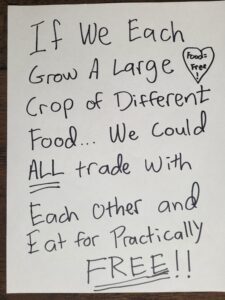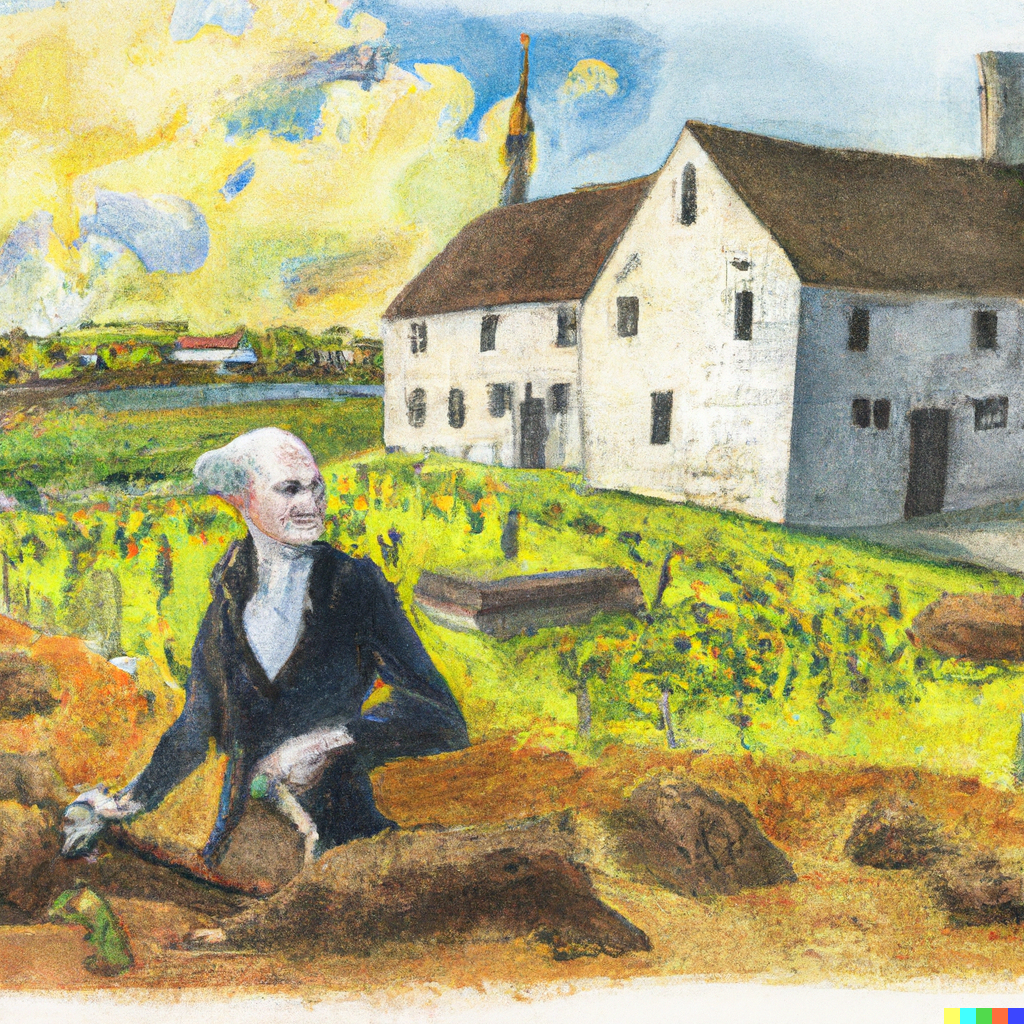In my previous post, I snacked on a popular meme about self-sufficiency in food. The creator of the meme–to their credit–recognized the problem of “do it all yourself,” but failed to recognize the limits of their reasoning. If you follow the logic to its conclusion, the result is surprising. I drew upon the wisdom of Adam Smith and Walter Williams to flesh out that reasoning.

But all of what we have looked at so far is a side issue. The main insight of the memer is the accidental (re)discovery of division of labor as the source of prosperity, or—as Smith called it—“opulence.” As I have argued elsewhere, the remarkable thing about division of labor is that specializing in one activity—in this case, one food crop—would quickly cause substantial increases in productivity, even if we were all clones at the outset. So, the difference between State A and State B mostly lies in what happens after we begin to specialize. After several years of growing only corn, and learning what makes it grow, practicing specific techniques, and developing tools adapted solely for the production of corn, I will be able to produce far more corn on four acres than the four non-specialists could have produced on the same four acres at the outset. The same is true of the specialist in beans, in wheat, and in tomatoes.
Division of labor, based on what Smith called dexterity—practicing techniques and becoming more skilled in specialized movements—and what he called tool use—the development of specialized implements suited only for corn—might double, or quadruple, the output per acre. As Smith put it, “The greatest improvement in the productive powers of labour, and the greater part of the skill, dexterity, and judgement with which it is any where directed, or applied, seem to have been the effects of the division of labor.”
The consequence may be surprising, if you haven’t read Smith: the total acreage devoted to each crop is the same in State A and State B, but the shared output is higher. We all eat better, under division of labor than under self-sufficiency.
While the memer has rediscovered division of labor s/he does not understand the extent of the insight. The meme-board claims we should all grow food; why? If specializing in one type of food, and trading for the rest makes sense, why would this same reasoning not extend to all the other things we desire in life?
Humans want more than food; we also want clothing, shelter, cars, cell phones, and….other stuff. If a phone maker quits that job and grows food, that is not a net benefit: food would indeed be even cheaper, but there would be no phones. Once one sees that the degree of specialization increases the amount and quality of things available through commerce, then it is clear that more specialization leads to more opulence. As Adam Smith pointed out, the greater the division of labor, the greater the increase in prosperity, but “the division of labor is limited by the extent of the market.” And there is another implication, a consequence that many people would find astonishing: even if we all started out as clones, with identical ability, the elaboration of division of labor would lead us into profound differences in skills and occupations. Smith is self-aware enough, and egalitarian, enough to apply this logic to his own profession!
We don’t all have to grow food, but we all have to do something to figure out how we can best serve the other members of society. Most people don’t even have access to land, because they live in cities. We already have a housing shortage in many urban areas; requiring farmland makes that worse. The fact is that urban areas, especially densely populated urban areas, are more energy efficient and have smaller environmental footprints than detached housing. In many cities, having a garden is actually illegal, and in even more cases is subject to regulations that make the sort of exchange described in the meme a serious crime.
Finally, and not least, having grown up on a farm myself (I still don’t like oranges much, honestly, having picked so many tons of them), I have to say it’s not that great. The amount of food one has to produce to acquire the “service certificates” to support a family is enormous. A “large crop” of a few bushels, once per year, is not going to make anything free.
Michael Munger teaches at Duke University and is Director of the interdisciplinary program in Philosophy, Politics, and Economics (PPE) at Duke University. He is a frequent guest on EconTalk.
Read more of Michael Munger’s writing at Archive.


READER COMMENTS
Ahmed Fares
Feb 22 2024 at 2:48pm
Richard W Fulmer
Feb 26 2024 at 7:17pm
However true Adam Smith’s critique of the division of labor may have been when he wrote The Wealth of Nations, it is far less so today. Automation has replaced many repetitive, monotonous tasks. Companies typically offer employees training and opportunities for advancement. Working hours are now much shorter than they were in 1776, leaving people time for outside interests. And education – both formal and informal – is far more available and far more varied than it was in Smith’s day.
Richard W Fulmer
Feb 26 2024 at 7:04pm
“It is the market – the least overtly spiritual of contexts – that delivers a profoundly spiritual message. It is through exchange that difference becomes a blessing, not a curse.” — Rabbi Jonathan Sacks
Comments are closed.